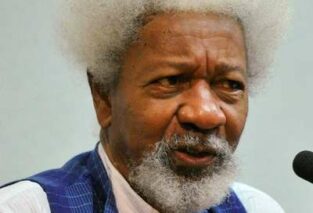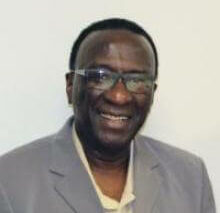(Revised and reproduced from Cameroon Life Magazine Vol III No 6 July 1992).

The 1990s were marked in Cameroon by a popular uprising against the Biya regime that has come to be known as “Ghost Towns.” In the ensuing chaos, a strident “radical voice of defiance” could be heard, rallying and encouraging, through his writings, the still fledgling and frail opposition to the regime. It belonged to the controversial economist and political analyst, Celestin Monga. His voice was first heard in an open letter he wrote to President Paul Biya in the weekly newspaper, Le Messager’, asking the President to step down and give room to someone more competent to rule the country.
The Biya regime’s panicky response was to drag both Monga and the Messager publisher, Pius Njawe, before a muzzled court, which did not hesitate to hurl both men in jail. The political dust raised by the Monga-Njawe case had barely settled when Monga again published an interview with a former SCB bank manager, Messi Messi, in which the latter openly and directly accused President Paul Biya and his wife, Irene, of being responsible for siphoning funds from a local bank, Société Camerounaise de Banque (SCB), which eventually led to its collapse.
It was at the height of these controversies that Cameroon Life Magazine met and talked with Celestin Monga. Several decades later, with the stay-put Biya still firmly in place, I revisit that interview.
Mr. Monga, when you were arrested in January, 1991, for slandering President Paul Biya, many Anglophones didn’t have the chance to read your incriminating “Open Letter” as that issue of Le Messager newspaper was seized by the police. Then a few months back, you exploded another bomb with your interview with Messi Messi, which implicated the presidential couple in the collapse of the SCB bank. For a start, would you mind telling us something about yourself, where you were born, where you went to school, what your family life is, if it is affected by the pressures on you lately?
No, no, that’s my private life and I won’t talk about it. Why would anyone want to know about my private life?
C’mon, you’re now a public figure…
No, I’m not a public figure; I’m a banker, that’s all.
How about where you were born?
I was born in New Bell, here in Douala; but of what interest can such information be to anyone, really?
You can’t be the judge of yourself, you know. What you think isn’t important to you could be of interest to our readers. What about your parents? Are they still living?
That’s my private life and we shouldn’t talk about it at all.
Okay, since you insist we’ll talk about your job.
(Visibly relieved) That’s fine with me.
Now tell me, how did you get this job with BICIC?
Like everyone else, I applied for it. I wrote an application to the BICIC General Manager at the time, Mr. Akame Mfoumou. That was towards the end of 1986. He wrote back inviting me for a test. He was then trying to create a department of economic studies in BICIC and he asked if I would like to head it and that’s how I came to work with the bank.
Were you still in France then?
No, I came back to the country in August 1986. I began by teaching at the University of Yaoundé Advanced School of Mass Communications (ASMAC). I knew Mr. Fame Ndongo and we taught together but the job was not interesting at all. We faced lots of problems: no library, no facilities, no money, etc. I was planning to go back to France when I ran into Mr. Akame Mfoumou and he told me about this job.
It’s surprising you didn’t like teaching journalism being a journalist yourself?
Oh no. I’m no journalist at all. I studied economic sciences and political sciences, not journalism.
Where was that?
I studied at the University of Bordeaux 1 and later at the Sorbonne 1 (Pantheon) in Paris.
Some say that you were in Paris when Mr. Akame Mfoumou decided to offer you this job so you could write praise songs to President Biya; but that once you were confirmed in your job, you turned against him. Is that ingratitude, or what?
No, no, that’s not true at all. Mr. Akame Mfoumou didn’t know me before we met in Douala in September 1986.
Now about your stay abroad, it would seem you worked for Jeune Afrique in Paris.
No, I didn’t really work for Jeune Afrique, as such. I was a student in Paris and I had already published a few articles here and there. I knew Mr. Ben Yamed, the General Manager of Jeune Afrique, and we had good relations. I worked for him on a free-lance basis, not as a full-fledged journalist. That’s one reason I felt I wasn’t really qualified to teach journalism. I never trained as a journalist and I lacked the technical expertise that goes with that job.
Your relationship with Jeune Afrique must date back a long time then as you interviewed former President Ahidjo when he left power in the early 80s. Were you assigned to interview him?
I met Mr. Ahidjo because he was a very good of Siradou Diallo, a Guinean, who was the Editor-in-Chief at Jeune Afrique. That’s how I came to meet President Ahidjo. I talked to him as a Cameroonian, not as a journalist for a foreign paper.
Did you ever have a chance to meet President Paul Biya?
Yes, I met him in February 1983 in Paris. I believe it was his first official visit to a foreign country. I met him like every other Cameroonian even though Mr. Ben Yamed had asked me to talk to him for his paper. We barely exchanged a few words as there were many people there then. That’s the only direct contact I’ve had with him.
What were your first impressions of him? Did you, like most people at the time, feel that he was the right man for the job?
I don’t remember exactly what I thought of him then but one thing struck me, though; I thought he was too well dressed for my liking.
Since we’ve mentioned Biya, let’s talk some more about him. Each time I pick up any of your writings on him, I have the impression that you use very hard, if not violent words. Why is that so?
Do you really think I’m violent? Let me tell you something, you cannot be soft when you write about an embezzler. I know many people in New Bell and throughout this country who live from hand to mouth. Compare that to Biya and his group and the contrast is revolting. So when I write, I have these two contrasting pictures in my mind: one of abject poverty with families barely surviving, and the other of Biya and his cronies playing with money. So, I don’t consider myself as violent at all.
What would you say is the root cause of such abuse of power and privileges in this country?
I would say that four centuries of slavery and colonialism had a lot to do with it. I see Mr. Biya as a product of our society. I think almost everyone of us has something of a Paul Biya in him. Just take a look at the way people drive in a city like Douala. It’s absolute chaos. We’ve lost every trace of moral values. There’s what I’ll call a deficit of civic duties. I think that’s the real source of our problems.
Do you believe that the political leaders who are jostling each other to take Biya’s position can do better if given the chance?
Let’s be realistic, it will not be that easy at all. It isn’t easy to change people overnight but I think that could be possible if we had a leader who could give this country a sense of purpose and direction; someone who believes in change for the better and who can lead us to believe in the possibility of a better tomorrow. That’s why I don’t believe that anyone in this regime can really help the democratisation process in this country. That’s not possible.
Do you think that if the institutions in place were to be changed, our leaders would behave differently?
Of course, it’s important to change our institutions to counter-balance the political game. We should strengthen the legislative power, and open the doors of the National Assembly to independent candidates. The bills proposed to the Assembly must not be considered private and confidential, as is the case at the moment. The press should be allowed to inform the people about the draft bills, and the main corporative organisations should be able to intervene in the voting process. In general, I believe that we need to establish new links between Parliament and the civil society. But, creating new institutions is one thing, the way they are made to function is quite another thing altogether.
What do you think of our present National Assembly for instance?
When I mention institutions today, I don’t really consider what we have in Yaoundé as a National Assembly. That’s just a joke. What’s certain is that we do not only have to overhaul those institutions but more importantly we need someone who can make us believe in the possibility of another future. That raises a question of confidence in our country today. Almost everyone has lost faith in this country. People who have money are trying to send it abroad as fast as possible; those with children are trying to send them abroad for their education. Those are clear signs that people don’t consider this country as a place where they intend to live till the end of their days. We need a leader who can make us believe in ourselves and in our country. What we need is a psychological shock to be administered by someone who can make us believe in the possibility of a better tomorrow for our country.
Do you see any of our leaders today who can lead us to that future?
Oh yes, we have a few leaders who can do that, yes.
Would you care to mention some names?
(Laughing) There is no need for that. Cameroonians know people who can change this country. It’s not for me to tell them.



